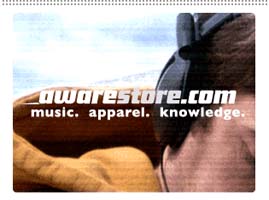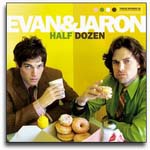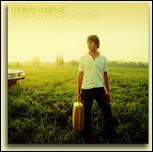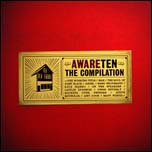|
|
|
|
|
Will
Healy
|
|
|
|
A
lot of people are familiar with Aware Records and the Aware Store. We've gone there to pre-order CDs from some
of our favorite artists, including Matt Nathanson, Glen Phillips, and John
Mayer. But, have you ever wondered who
was behind those pre-orders? We called
Will Healy, the man in charge of the ever-popular Aware Store, hoping he could
shed some light on what it's like to work in music distribution, the future of
the music industry, and who is creating a buzz in the world of independent
music. |
|
|
|
Way
Cool:
|
Can you briefly describe your background and how you came to
be affiliated with Aware Records? |
|
|
|
| Will
Healy: |
I'm from Wilmington, DE and in high school, I got a job at a
local record store. I went to a few
years of college at the University of Delaware. I became the manager of that store. Went another year of college in Virginia. I decided to take a year off and went back
to work at the record store and found out about this label, Aware. They basically just put out a compilation
each year. They were in business
two years and it was basically a compilation of independent artists. Obviously, I liked the music (and) dealing
with the record store. (I) listened to
the compilation, and started selling a ton of them, and made a contact at the
label. The label itself used to be the
CD store for the HORDE festival, which is a traveling tour in the summer
time. They asked me to go and basically
handle all the CD sales for the tour. I
was going to go back to school at Emerson in Boston that following fall, and so
I figured that would be a fun little summer touring. Half way through it, they offered me a job
to handle retail for the company. So, I
moved out here and haven't left.
|
|

|
|
|
|
|
|
WC:
|
You've been with Aware for eight years. When you first started working at Aware,
what was your job title/responsibility versus where you are now?
|
|
|
|
|
WH:
|
The company was four or five people big, so everyone was pretty
much a VP when they stepped in the door.
My job was pretty much handling retail and marketing; basically taking
the product we had available out with distribution, dealing with distribution,
and making sure it got into stores.
Also, making sure the stores knew exactly what they were stocking. At certain times, maybe (I'd) spend a little
co-op money, which is basically advertising, whether it is a listening station,
an end-cap display, or print adĚ.something in that realm. Obviously (we'd) revolve that co-op to
whatever band was touring around in certain markets. If it was a compilation with a band that was really hot in
Atlanta, obviously we'd really push it in that area. So, it was more of getting the product out there in the
beginning. Again, the label was only three
years old when I joined it. We really
didn't have anyone too significant signed to us. We had a band, Stir, which later that record was sold to
Capitol. We had just released two
CDs: one from a band called Farmer,
which of course, went defunct about four months after we released the record; and
a band called 19 Wheels. So, we were
all learning pretty much. It was more
of a trial and error thing. With no
money, promotions were hard to come by, so we had to do a lot things
grassroots, kind of hand-done. it's
kind of nice looking back at those days and just laughing at ourselves at some
of the things we had to do to get CDs in the stores. That's what it was like just walking in there.
|
|
|
|
WC:
|
How is that different than what you do now?
|
|
|
|
WH:
|
Now it's totally different.
We have an affiliation with Columbia Records, so a lot of my retail uses
are no longer needed because we now have Sony Music. Within Sony Music, there are about 1,000 people doing the job I
was doing. So, about five years ago, we
started the Aware Store. We always had
a little retail biz, a closet mail order thing over the phone. Then the Internet came and we had to at
least post some CDs. So, we had four
compilations and two CDs. We got a call
one day from a band who wanted to sell their CDs on the store. We only sold maybe 20 CDs of just the bands
on the comp, so we (asked), "Why?" They
said that they wanted to be associated with the brand somehow, even if they
couldn't get on a compilation. So
that's kind of how the store started.
Since then, we now stock about 1,400 individual bands, independent and
developing artists. All the bands that
we do stock go through a submission process.
We need to listen to it, and if we can recommend it to our customers,
we'll bring it in. We don't want to
have the most music, just the best quality, and our customers know that. There are a lot of blind orders. If I send out a mass email of all the new
releases, people go and check out a couple sound samples. They'll buy the CD because people know we
listen to everything first and we're on the lookout for the quality. People buy it and they'll send emails back
and say, "I just want to let you know that I heard one sample off of this. I know you screen things first and I love
this CD. I've found my new favorite
artist."
We're obviously trying to grow. We've started forming personal stores for artists, for larger
artists like The Jayhawks, Josh Rouse, Liz Phair, and artists like that. We'll create a personal store so that it
matches their site. So, when a fan goes
to shop, they're actually at Awarestore.com when they still think they're still
at the artist's site. That's starting
to move a little bit, too, and we'll obviously get more into that as we move
forward as a company.
|
|
|
|
WC:
|
What's your typical day like?
|
|
|
|
WH:
|
Coming in, evaluating the orders. I have an intern that handles fulfillment. Just making sure money is coming in, paying
the bills off, going through submissions, sound samples, working marketing,
looking at whatever companies that feel right for us to work with in the
futureĚdoing stuff with that. Scouting
out larger artists, basically trying to convince artists to maybe drop what
they're doing and go with the Aware Store.
Pretty much, just oversee What's going on, thinking for the future and
what we need in order to get to the next month and the month after that.
I see What's coming in, and we have a good amount of orders
coming in. it's up to me to figure out
who's the next big artist we need to find before everyone else. There are plenty of them out there; it's
just a matter of finding them before the next guy.
|
|
|
|
WC:
|
So, who are some of the big artists that you're selling
right now?
|
|
|
|
|
|
|

|
|
WH:
|
There are two artists who are doing really
well right now. One named Matt Wertz
and one named Dave Barnes. The thing
is, we found these guys about three years ago with their first CDs. They sold a decent amount, but not the
amount that they sell today. So it's
stuff like that you always got to be on the lookout for; it may sound good, but
it may not have sold well in the first five months out, but their next record is
going to hit.
|
|
|
|
|
|
Another band right now is a band that used to be with
Columbia. We've worked with them in the
past before they were signed, a band called Evan and Jaron. They're independent now and back on the
road. This is their first release in
the last three years. They're doing really
well.
There are other artists.
We actually handle the merchandise for now Matthew Sweet. He just released a Japanese import, which is
doing really well. A band called The
Clarks, we handle an exclusive CD for them.
A local band called Bottle of Justice is doing very well.
|
|
|
|
WC:
|
How many artists are affiliated with the Aware Store right
now?
|
|
|
|
WH:
|
I would say the artists that are independent, it's in the
1,200 - 1,300 region. We have about
1,500 bands, but that also includes bands who are, maybe, signed to Universal,
but are a developing artist. So, they
may not deal exclusively with us, or even know they are on it. We do sell some bands like Pearl Jam and
Pink Floyd and Zeppelin because we have a college-based crowd. Our demographic is from 18-30
something. With major label type items,
we sell them pretty cheaply because we just want it as a convenience. If you're a college kid and you're buying
the new Howie Day CD and you want to buy ╬Dark Side of the Moon' for $13 or
$14, go for it. it's just a
convenience-type thing. We're hoping
that if they found ╬OK Computer' for $12, they're going to tell their friends
that they got it for $12 on the site.
They go (to the site) for ╬OK Computer' and (say), "Oh! I didn't know they sold Ari Hest" or some
other independent artist. So it's kind
of a cross promotion. We don't deal
with a lot of major labels, but the stuff we do deal with, it's pretty
inexpensive compared to other sites.
|
|
|
|
WC:
|
What's the most stressful part of your job?
|
|
|
|
WH:
|
Message boards. If
there's one problem with an order, someone posts it up on a board, and it's
like we just screwed up 100 orders all at once. That's a hard one, dealing with those fires.
Another one is just dealing with a retail market right
now. We're fortunate that sites like
Kazaa and other download services don't really affect us because we're dealing
with independent artists and bands. As
an independent music fan, you want to have the CD and that artwork. You want to take it into a bar and say,
"Hey! Look what I found! This guy Matt Wertz, he's pretty
awesome." I think that's a difference
in terms of what we sell versus a site that sells major label stuff.
|
|
|
|
WC:
|
How do you go about putting out fires related to message
boards?
|
|
|
|
WH:
|
it's about making a post and saying, "Hey. This is Aware Store. This was a one-time issue that
happened..." It may have been that the order
was shipped to their billing address rather than their shipping address.
|
|
|
|
WC:
|
You have 1,300 artists affiliated with the Aware Store. Is there any type of common theme or sound
to the artists?
|
|
|
|
WH:
|
We try not to, but because of our fan base, most of the
people who want to sell with us are primarily pop rock singer/songwriters and
acoustic artists. We are always trying
to bring in a diverse group of people, and we accept diverse artists, whether
it's jazz, R & B, bluegrass, or country.
Not only do we go out and look for it, but we encourage bands to submit. The most common is the singer/songwriter
genre. Obviously, the bands that are on
Aware Records are pretty similar, and the bands that sell the best are also in
that genre. it's just where everyone is
going to find that type of music.
|
|

|
|
|
|
|
WC:
|
What exactly is the connection between Aware and
Columbia.
|
|
|
|
WH:
|
You can think of us almost as a triple A ball club. We are not owned by Sony Music. We basically have a deal with Columbia
where, if we find an artist and we can develop them up to a point where they've
sold a certain amount of CDs and sold out in certain markets and We've done it
all at a grassroots basis without spending too much money, We've basically
established a band that can go out and tour and make a living. The biggest problem with a major label is
actually putting in the time and developing the artist so that when you have
the hit single, it's only going to go, instead of typically throwing money
against the wall and seeing what sticks.
Basically if you have new artist on a major label, they're going to put
all the money into the music and the single.
It could be a huge single, but when the single is done, you now notice
that their tour base goes from playing 1,200 seaters to maybe 600 seaters. (What) we try to do is try to get these
guys into 400 seaters before the hit single is done. Then when you have the hit single, even if it doesn't hit as
well, Columbia is going to spend enough money on the second single because they
know (the band is) still selling a large amount of records, still touring and
selling out the clubs. They're really
not as worried about the investment in a way, because it's not as big of a
gamble.
So that's what we do, we develop bands. When it's time and Columbia is up for it and
they think it's ready to go, it becomes Aware/Columbia. Then we both work the record. Now, in the case of John Mayer, we released
╬Room for Squares' independently first.
Columbia was ready to go within five months because it was getting such a
great response. So, we repackaged it,
put an extra track on there, remixed a couple of songs, and re-released
it. In other cases, like Five for
Fighting, Columbia was ready to go with it right then, so it was released
Aware/Columbia. We are another set of
eyes and ears for Columbia but we're not owned by them.
|
|
|
|
WC:
|
You guys have recently started taking orders for your Aware
10 compilation CD. What is the process
you go through to decide who is going to be the Aware Compilation CDs?
|
|
|
|
WH:
|
Basically, we do get submissions, but it's a lot of us
checking out what the buzz bands are and what people are listening to. Everyone has different tastes in music, so
we're just out there looking for the best 13 bands we can find.
Fortunately, a lot of them actually come through the Aware
Store. I think we have two or three that we
found on Aware Store and we ended up using them. We're fortunate that way.
A lot of them come through friends who are in management and some
independent bands sending submissions.
In the first three years of existence we used to be called the hippie
label. There are still writers who
consider us a hippie label because Aware 1 and 2 had a lot more jam-oriented
bands. Now it's pretty diverse. It goes from reggae to rock to soul to
singer/songwriter, folk, and everything else.
Aware 10 is a pretty good mix.
|
|
|
|
WC:
|
Getting back to more of the business side of things, what
types of personality, traits, skills or qualities should a person have to be a
success at a label like Aware?
|
|
|
|
WH:
|
Patience. We're a
baby label so it's not all glamour and everything else like that. When you work for a baby label and you're
independent, you work your butt off.
The rewards come at the end. The
pay isn't great. It isn't bad, but you
just have to realize that there's a bigger goal down the line. Right now, you're busting your ass to see this
band win a Grammy two years from now.
That's actually where the reward comes.
Personally, when Train received their first Grammy, there was just
something about it. I remember being
their first tour manager and them crashing at my parent's house for five days
because we couldn't afford a hotel room.
it's times like that where it makes it all worth it.
What do you need?
You don't have to be a wheeler and dealer necessarily, or have a
personality where you could sell ice to an Eskimo. You have to be patient and realize there are a lot of things that
go into working a record. There are a
lot of different opinions about how things go, so your way and thought
processes aren't always going to be the way to go. Also, working with a band for their best interests and
compromising on things and making sure you're doing it to the best of your
ability with the resources allowed.
|
|
|
|
WC:
|
You mentioned that the pay off could be anywhere from two
years to even longer. What are some of
the immediate perks?
|
|
|
|
|
|

|
|
WH:
|
You're listening to music all day! You can't beat that. I'm
sitting here in a nice fleece and jeans because it's a little chilly
today. I just got done rockin' out to
some CDs before you called and I just got done seeing three shows this week. So, if you're a music lover, the perks are
definitely there. On the flip side,
people that have that 6-figure income always feel like, "Wow! You have the best job!" Granted, I'm not making the kind of money
they are, but it's worth it. it's not a
lax job, it's a very challenging job, but the perks are definitely there if you
like music.
|
|
|
|
|
|
|
WC:
|
So, where do you see yourself in five years?
|
|
|
|
WH:
|
That's a good question.
Hopefully a larger office. I'm
probably still going to be working retail but I want to be in a big warehouse
because my company has expanded, where I can oversee CDs and t-shirts and
everything like that. That's good for
me. I see myself doing the same thing
I'm doing now, only on a larger level.
Hopefully the store will take off to a different place in the next
couple of years and that's all going to depend on which way the music industry
goes in terms of the music format. it's
obviously going to be interesting over the next three years when things are going
to start up and probably start over again.
I definitely would like to see myself with the same company in five years,
but grown to a larger level.
|
|
|
|
WC:
|
How do you see the Internet and the prevalence of
downloading of music, legally or illegally, affecting the restarting of the
music business?
|
|
|
|
WH:
|
Well, it's going to be, "Let's tear down the plans, it's
time to get a whole new game plan." I
think five years from now, there are still going to be CDs, just not as many. My feeling is that there's no point for a
label to re-manufacture the back catalog of Simon and Garfunkel. Probably five years from now, everyone is going
to have something on their key chain where they just plug into a music store and
download what they want and pay for it.
I see maybe having CDs for the latest two releases from an artist, but the
back catalog will only be available for download because it's going to be
profit for the label, profit for the artist, and not dealing with the middle
man in terms of: a) the distributor,
and b) making a physical product. I
think once the labels figure out how to basically get rid of the illegal
downloading to a point where everyone understands that you must pay for it, I
think you're going to find a lot more people doing downloads.
Now, CDs are still an easy format to deal with. Not everyone is going to have an MP3 player
in their cars in the next three or four years, so CDs will still be around. I think that for independent bands, they are
still going to be around. Again, it's going to be tough to figure out how to
get that word-of-mouth out there if there's nothing really out there to provoke
it. Obviously passing out CDs and
bringing them to parties, and stuff like that still have a huge impact; it
definitely did for (John) Mayer. For
independents to do well on the road, if they're selling 20 CDs, that's a huge
source of income for them to keep touring.
That's still going to be available for a while in the independent
market, but for major label market and back catalog items, you're going to see
more where it's only available for download unless you want the store to make a
custom CD for you, and that's going to cost a little more money.
|
|
|
|
WC:
|
Aware is located in Chicago, so I wanted to ask you who some
of the up-and-coming artists are in Chicago, whether they are affiliated with
Aware or not.
|
|
|
|
WH:
|
(Rachael)
Yamagata, she's good.
Who else? Kill Hannah is
good. I like OK Go and I'm hoping they
do something. OK Go came out with a
pretty good record.
|
|
|
|
WC:
|
What music are you currently listening to?
|
|

|
|
|
|
WH:
|
Jem. Wilco. Beach Boys.
Anything from the Jayhawks. A
band called Ho-Hum. They are good, kind
of in the genre of the Flaming Lips.
And Teitur.
|
|
|
|
WC:
|
So, outside of the music industry and business, what are
some of your other interests?
|
|
|
|
|
WH:
|
Golf, baseball games, but pretty much music absorbs my
life. Unfortunately, the job is pretty
much the life at times.
|
|
|
|
WC:
|
Finally, We've come to my favorite part of the
interview. it's time to play 7
questions.
|
|
|
|
|
|

|
|
|
|
|
What's the worst job
you've ever had? Cashier
for a supermarket.
|
|
|
|
|
|
What's your favorite
movie or lyric quote? I'm
your huckleberry.
|
|
|
|
|
|
Who would you want to
star in the movie of your life? Myself.
|
|
|
|
|
|
What's your favorite TV
theme song? Good
Old Boy's - Waylon Jennings
|
|
|
|
|
|
If you were a
superhero, what would your name be?
Strong
Bad
|
|
|
|
|
|
What do you want to be
when you grow up? Retired
|
|
|
|
|
|
Finally, why are there
so many songs about rainbows?
Kids
like rainbows.
|
|
|
|
|
|
|
|
Visit the
Aware Store at www.awarestore.com.
|
|
|
|
|
|
|
|